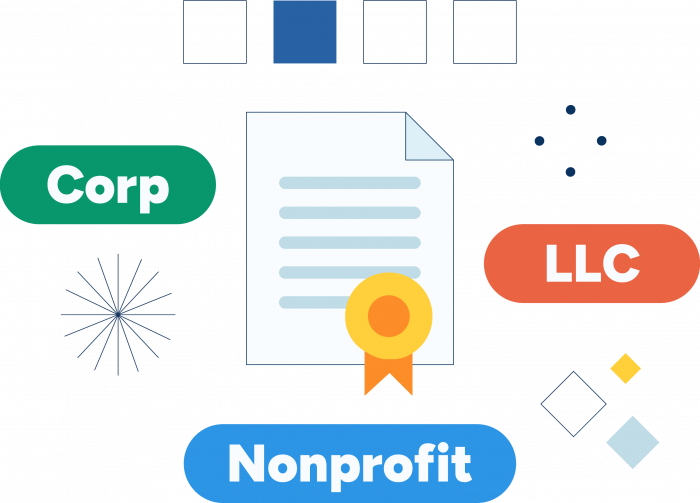Business Formation
Hire us to form your LLC, corporation, or nonprofit and we’ll include a year of Registered Agent Service. And if you’re ready to launch your online business identity, we can register your domain, set up a phone number, and get you a website in minutes.
What Is a Business Entity?
A business entity is an organization (like an LLC or corporation) with separate legal existence from its owners. This separation is known as limited liability, and it’s the main perk of forming a formal business entity with the state.
If you don’t form a business entity and you’re selling something, you’re operating as a sole proprietor (or a general partnership, if you have partners). Sole proprietors and general partnerships do not have limited liability. This means that any debts owed by the business are also owed by the owner. The business and the individuals who own it are one and the same. Limited liability protects business owners from being held personally responsible for paying business debts.
To form a business entity, you need to:
- Get a registered agent
- Come up with a business name that complies with your state’s rules
- File formation documents with the state
Common Entity Types
Business entities are formed at the state level. This means that the structure is defined in state statutes rather than federal law, and that to form an entity, you’ll pay a fee and file paperwork with your state’s Secretary of State or equivalent commercial regulatory agency. While statutes differ in every state, the basics are the same. Here are the main entity types:

Limited Liability Company (LLC)
LLCs are known for strong liability protection and operational flexibility. What does this mean? Compared to a corporation, LLCs have very few requirements for how they can be managed, owned, and operated. For example, LLCs don’t need to hold regular board meetings, keep extensive records, or adhere to a mandated management structure. An LLC can have a single owner (member) or many. The owners can be individuals or business entities. When it comes to taxes, LLCs are taxed as “pass-through” entities by default, which means members simply report profits on their personal tax returns. But LLCs can also elect to be taxed as a corporation if it works better for the business. Despite its loosely defined structure, an LLC offers the same strong liability protection a corporation does.
Corporation
Like an LLC, a corporation has limited liability, which shields business owners from being held responsible business debt. Unlike an LLC, a corporation has an ownership structure prescribed by state statutes, wherein shareholders elect a board of directors. Corporations are also required to hold regular board meetings and keep records. Corporations pay the federal corporate income tax on profits, and shareholders must also pay taxes on any dividends received. Transferring ownership of a corporation is easier than transferring LLC ownership, as shares of the corporation can be bought, sold, and transferred with relative ease.
Nonprofit Corporation
A nonprofit corporation is a type of corporation organized to pursue a mission that benefits the public or a group with shared interests. Unlike in a corporation, where profits are distributed to shareholders, nonprofit income is reinvested in pursuit of advancing the charitable, educational, scientific or religious mission. A board of directors or trustees oversee the nonprofit, appointing officers to carry out daily operations. Nonprofit corporations don’t automatically receive tax-exempt status. For that, a nonprofit needs to meet certain requirements and apply with the IRS.

Benefits of Business Formation
When you hire a professional registered agent to form your business, you get more than an LLC or corporation. You’ll get tools to set up and maintain your business properly.

$4.95 Domain Name
Register your domain with us and choose your first .com, .net, or .org for just $4.95 for the first year. Other TLDs are available at market price.
Privacy Protection
We’ll use our information (including our physical address) on your public documents wherever permitted by law.
Additional Branding Tools
Get a business website with SSL security, a dedicated business phone number, and a professional email address @yourdomain.
Local Experts
Our staff are experts in business formation in all 52 jurisdictions and will file your paperwork correctly and on-time.Browse Our Business Identity Services
How Our Business Formation Service Works
As a Registered Agent company, we form businesses everyday. Here’s how it works.
1
You tell us a little bit about your business.
What kind of entity are you forming? Where will you be doing business? Do you have a business name in mind? We’ll ask the questions and gather the needed info for your paperwork.
2
Add on any branding tools you need to launch your business.
Register a .com, .org, or .net for just $4.95 for the first year, and get an email address, website, and phone number each for $5 per month.
3
Submit your order!
We charge $100 plus state fees to form your business. This includes one free year of registered agent service. While the state is processing your documents, you’ll get access to your secure account. From there, you can manage services and access every state form you could ever need.
Frequently Asked Questions
What’s the best entity type for my business?
Since we don’t know you, we can’t say for sure. But a lot of small business owners who are just getting started find that an LLC works well. That’s because LLCs are extremely versatile. You can start one alone or with multiple partners. You can run it yourself or hire managers to run it. And you can pay taxes on your LLC’s profits on your own personal tax return or apply to be taxed as a corporation.
Corporations have benefits too. Transferring ownership is much easier in a corporation than it is in an LLC (it’s just a matter of selling shares), which can help attract investors. In the end, you’ll have to decide what your business most needs.
What’s the easiest kind of business to start?
Technically, a sole proprietorship. A sole proprietor is just an individual who sells something without filing paperwork to form a business entity. Sole proprietors don’t need to file any paperwork to form or maintain their business. Sole proprietors don’t need a separate bank account or any paperwork documenting their business.
But sole proprietors also don’t enjoy limited liability status, which means that if they’re sued, their personal assets are on the line. Learn more about the differences between sole proprietors versus LLCs.
How much does it cost to start a business?
It depends on what kind of business you’re starting and where you’re starting it. In Colorado, for example, it costs $50 to file your LLC registration paperwork with the state. In Massachusetts, that same entity type costs $500 to file. If you hire us to form your business, our filing fees are just $100 plus state fees.
You also have to factor in the money you’ll need to appoint a registered agent. We charge $200 per year for registered agent service and that includes filing your state compliance report—you just pay the state fee.



